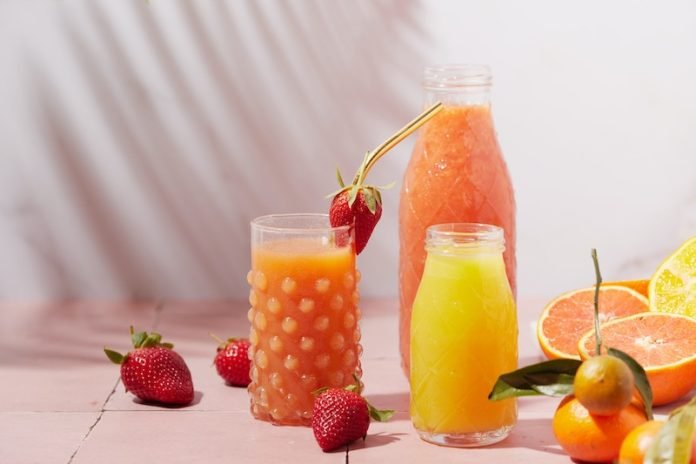
A new study from Tulane University has found that some commonly consumed beverages contain levels of toxic metals that exceed federal drinking water standards.
The study tested 60 different beverages for 25 different toxic metals and trace elements, including fruit juices, plant-based milk, sodas, and teas commonly found in grocery stores.
The results showed that five of the 60 beverages tested contained levels of a toxic metal above federal drinking water standards.
Among them, two mixed juices had levels of arsenic above the 10 microgram/liter standard, and cranberry juice, a mixed carrot and fruit juice, and oat milk each had levels of cadmium exceeding the 3 parts per billion standards.
The study found that mixed-fruit juices and plant-based milk (such as oat and almond) contained elevated concentrations of toxic metals more often than other drinks.
All told, seven of the 25 elements exceeded drinking water standards in some of the drinks, including nickel, manganese, boron, cadmium, strontium, arsenic, and selenium.
While lead was detected in more than 93% of the 60 samples, most contained very low levels, below 1 part per billion.
Tewodros Godebo, lead author and assistant professor of environmental health sciences at Tulane University, said the study was important because there are few peer-reviewed studies examining the contents of American beverages.
He explained that these soft drinks are often consumed in smaller quantities than water, meaning the health risks for adults are most likely low.
However, parents should be cautious about what drinks they offer their children, as arsenic, lead, and cadmium are known carcinogens and are well-established to cause internal organ damage and cognitive harm in children, especially during early brain development.
Godebo said that most of these elements found in beverages presumably come from contaminated soil and that these metals are naturally occurring, so it’s hard to get rid of them completely.
The study’s authors hope that their findings will encourage people to think more about what they consume.
Godebo said the next step is to conduct a risk assessment based on the data collected to see the impacts of consuming toxic metals in children and adults.
He added that the team is curious to keep exploring what’s in our drinks and foods commercially sold to consumers.
How to reduce toxic metals in your diet
Toxic metals such as lead, arsenic, and cadmium can be found in many foods and drinks, but there are steps you can take to reduce your exposure. Here are some tips:
Be mindful of the types of foods and drinks you consume: As the study showed, mixed-fruit juices and plant-based milk can contain elevated levels of toxic metals.
Try to limit your consumption of these and other packaged foods and drinks. Instead, opt for fresh, whole foods and homemade drinks.
Know where your food comes from: Check where your food is grown and produced.
If possible, choose organic produce, which is grown without synthetic pesticides, fertilizers, and genetically modified organisms (GMOs), and is less likely to be contaminated with toxic metals.
Rinse fruits and vegetables: Rinse your fruits and vegetables thoroughly with water before eating or cooking them. This can help remove some of the toxic metals that may be present on the surface.
Cook with safe cookware: Cook with non-toxic cookware, such as stainless steel, cast iron, or ceramic, instead of non-stick or aluminum cookware, which can leach toxic metals into your food.
Drink filtered water: Use a high-quality water filter to remove toxic metals from your drinking water. Tap water can contain high levels of lead, arsenic, and other contaminants.
Be cautious with supplements: Be careful when taking supplements, as some may contain high levels of toxic metals. Look for reputable brands that have been tested for purity.
Test your soil: If you grow your own produce, have your soil tested for toxic metals to ensure that it is safe to grow food in.
By being mindful of what you eat and how you prepare it, you can reduce your exposure to toxic metals and protect your health.
If you care about health, please read studies about new drugs to treat diabetes and metabolic syndrome, and heavy cannabis use may decrease the incidence of diabetes.
For more information about weight loss, please see recent studies that Mediterranean diet can reduce belly fat much better, and Keto diet could help control body weight and blood sugar in diabetes.
The study was conducted by Tewodros Rango Godebo et al and published in the Journal of Food Composition and Analysis.
Copyright © 2023 Knowridge Science Report. All rights reserved.



